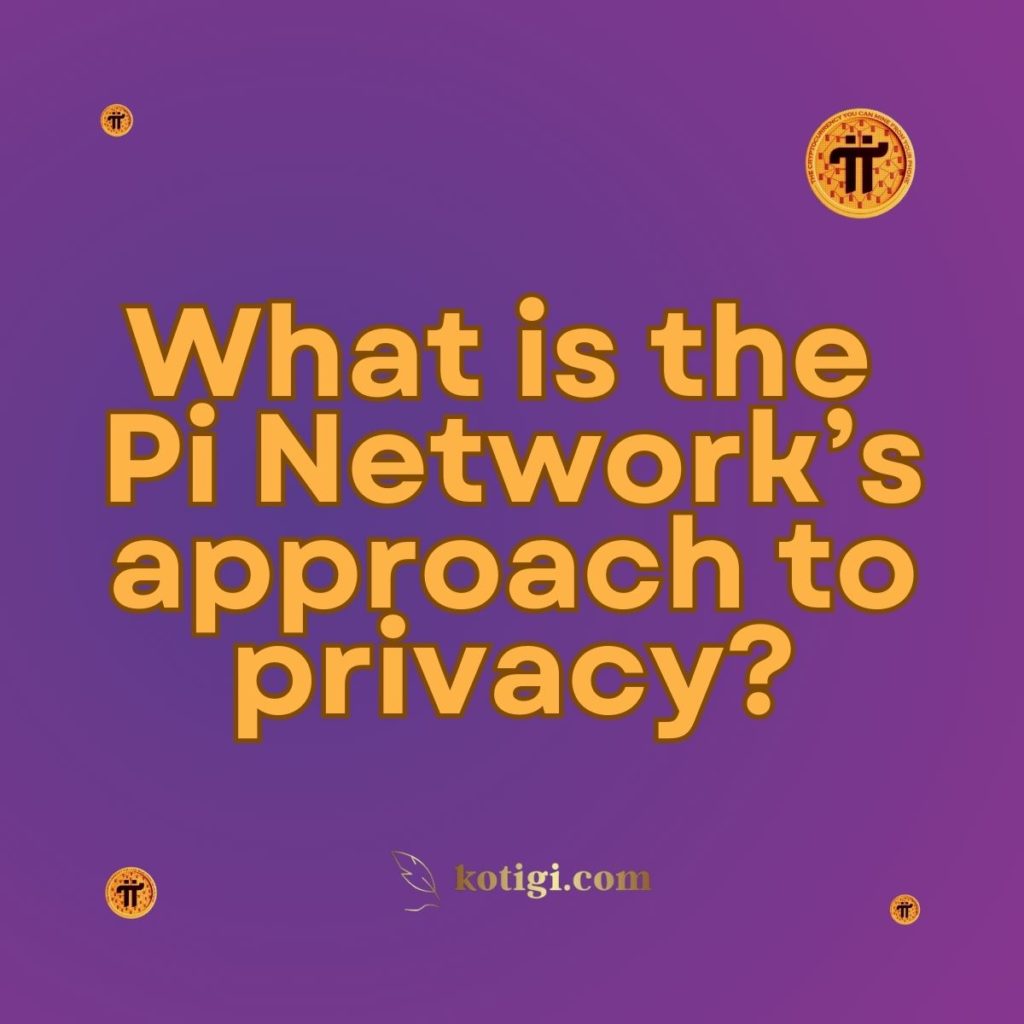
What is the Pi Network’s approach to privacy?
Pi Network prioritizes user privacy by implementing strong data protection practices and maintaining transparency in how user data is collected, stored, and used. With a focus on decentralization, Pi Network aims to give users more control over their personal information while safeguarding their privacy through advanced encryption and privacy policies that align with global standards.
Introduction
Privacy has become a critical concern in today’s digital landscape, particularly within the blockchain and cryptocurrency industries. As Pi Network continues to grow, it emphasizes the importance of protecting user privacy while offering a decentralized platform for its global community. This article explores Pi Network’s approach to privacy, detailing the steps it takes to ensure the security and confidentiality of user data, and how its privacy measures align with modern standards.
1. Data Collection Practices
1.1 What Data Does Pi Network Collect?
Pi Network collects limited personal information required to verify user identity and ensure network security. This typically includes basic details such as name, email address, and phone number during registration.
1.2 Justification for Data Collection
The primary reason for collecting user data is to facilitate the Know Your Customer (KYC) process, which helps Pi Network maintain a secure environment by verifying that users are real people and preventing fraudulent activity.
1.3 Transparency in Data Collection
Pi Network maintains a transparent approach to data collection, ensuring that users are fully informed about the data they are required to provide and the purpose behind its collection. Users can access information about the data policies through Pi Network’s privacy policy.
2. Data Security Measures
2.1 Encryption Standards
To protect user data, Pi Network employs advanced encryption techniques that secure personal information and ensure it cannot be accessed by unauthorized parties. Encryption is applied both to data in transit and data at rest.
2.2 Secure Data Storage
Pi Network ensures that all user data is securely stored on protected servers, reducing the risk of data breaches or unauthorized access. The platform follows industry best practices to safeguard sensitive information.
2.3 Preventing Data Leaks
Pi Network continuously monitors its systems to detect and prevent potential data leaks. The platform invests in the latest cybersecurity technologies to secure its infrastructure and uphold its privacy standards.
3. User Control Over Personal Information
3.1 Access to Personal Data
Users can access their personal data at any time through the Pi Network app, giving them greater control over the information stored on the platform. This allows users to review and update their data as needed.
3.2 Right to Delete Data
Pi Network complies with privacy laws such as the General Data Protection Regulation (GDPR), allowing users to request the deletion of their personal data. This gives users the right to have their data removed from Pi Network’s servers when they no longer wish to use the platform.
3.3 Data Portability
Pi Network also provides users with the option to transfer their data to another platform, supporting data portability in accordance with global privacy regulations. This empowers users to retain ownership of their information.
4. KYC and Privacy Implications
4.1 KYC Verification Process
Pi Network’s KYC process requires users to submit personal information, such as identification documents, to verify their identity. This step is critical for ensuring that only real users can mine and participate in the network.
4.2 Safeguarding Sensitive Data
During the KYC process, Pi Network ensures that sensitive data is handled with the utmost care. KYC data is encrypted and stored securely, with access limited to authorized personnel, further reducing the risk of exposure.
4.3 Privacy in KYC Procedures
Although the KYC process involves sharing personal data, Pi Network minimizes the impact on user privacy by adhering to strict data protection standards. The platform uses the information only for identity verification and does not share it with third parties without consent.
5. Compliance With Global Privacy Regulations
5.1 GDPR Compliance
Pi Network’s privacy practices are designed to comply with the General Data Protection Regulation (GDPR) in the European Union. This ensures that users in the EU have the right to access, correct, or delete their data, and that their information is processed in a transparent and lawful manner.
5.2 CCPA Compliance
For users in California, Pi Network also adheres to the California Consumer Privacy Act (CCPA). This law provides users with the right to know what personal information is collected and how it is used, as well as the right to request its deletion.
5.3 Privacy Laws in Other Regions
Beyond the GDPR and CCPA, Pi Network monitors evolving privacy regulations in other regions to ensure compliance. By aligning its privacy policies with global standards, the platform offers consistent data protection for all users.
6. Third-Party Data Sharing
6.1 Limited Data Sharing
Pi Network maintains a policy of limited data sharing with third parties. Any data shared with external partners is done in compliance with privacy laws and is strictly limited to what is necessary for the platform’s operation.
6.2 Third-Party Security Practices
When sharing data with third-party services, Pi Network ensures that these partners adhere to the same high standards of data security. The platform evaluates the security practices of its partners before any data is shared.
6.3 User Consent for Data Sharing
Pi Network also respects user consent, requiring explicit approval before sharing any personal data with third parties. Users can review and control their data-sharing preferences in the app’s privacy settings.
7. Future Enhancements to Privacy Features
7.1 Ongoing Privacy Audits
To maintain and improve its privacy practices, Pi Network conducts regular privacy audits. These audits help identify potential weaknesses in the system and ensure that user data is always protected.
7.2 Adapting to New Privacy Standards
As privacy laws evolve, Pi Network is committed to staying up-to-date with new regulations and industry best practices. The platform plans to continuously adapt its privacy policies to remain in compliance with emerging standards.
7.3 User Feedback on Privacy
Pi Network encourages users to provide feedback on its privacy practices. By incorporating user input, the platform can make ongoing improvements to ensure that it meets the privacy expectations of its community.
Conclusion
Pi Network’s approach to privacy reflects its commitment to protecting user data in an increasingly interconnected digital world. Through transparent data collection practices, stringent security measures, and compliance with global privacy regulations, the platform provides users with a secure environment for engaging with the Pi ecosystem. As Pi Network continues to grow, it remains focused on evolving its privacy features to meet the highest standards of data protection, ensuring that users retain control over their personal information while participating in the network.
Key Takeaways:
- Pi Network collects minimal user data for KYC and network security purposes.
- The platform uses advanced encryption and secure data storage to protect personal information.
- Users have the right to access, update, and delete their personal data within Pi Network.
- Pi Network complies with global privacy regulations, including GDPR and CCPA.
- Future enhancements to privacy features are planned to ensure continued data protection.





